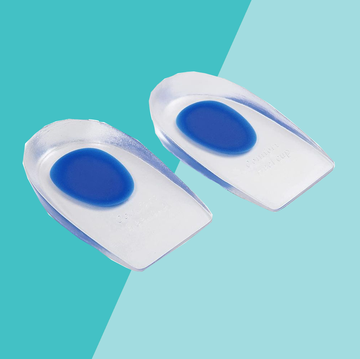Sore throat symptoms can be rough. Your saliva goes down like sandpaper, every cough makes you wince, and the only thing you can think about is making that lump in the back of your throat go away.
But to ease the pain, you need to understand what’s causing your sore throat in the first place: dry air, smoking, acid reflux, viral infections like the flu or common cold, and bacterial infections like strep can all lead to a sore throat.
In general, a viral infection usually comes with other symptoms, like muscle aches and fatigue, along with your sore throat, says Chester Griffiths, M.D., an otolaryngologist at Providence Saint John’s Health Center in Santa Monica, Calif. With a bacterial infection, on the other hand, the pain is usually more focused on your throat and the soreness tends to be pretty severe, Dr. Griffiths says. You may also have intense pain when you swallow, along with a high fever.
Exposure to smoke, breathing in dry air, and having acid reflux tends to feel “very different” from an infection, says Jason Abramowitz, M.D., an ear, nose, and throat specialist at ENT and Allergy Associates. “Usually patients do not feel as sick overall [and] the pain is also usually not as severe,” he says.
The good news: Sipping warm tea and sucking on cough drops or zinc lozenges can usually soothe the throat irritation and inflammation that are causing your agony, says .
Still, some of your favorite home remedies may just be masking the pain—not actually resolving it. If you really want to get rid of a sore throat, reach for these best OTC cures next time you’re feeling achy.
Meet the experts: Chester Griffiths, M.D., is an otolaryngologist at Providence Saint John’s Health Center in Santa Monica, Calif.; Jason Abramowitz, M.D., is an ear, nose, and throat specialist at ENT and Allergy Associates; Brett Comer, M.D., is a head and neck surgeon at the University of Kentucky College of Medicine; Mia Finkelston, M.D., is a Maryland-based family physician who also treats patients via LiveHealth Online; Raj Dasgupta, M.D., is an assistant professor of clinical medicine at the University of Southern California Keck School of Medicine; Aline M. Holmes, D.N.P., R.N., is a clinical associate professor at Rutgers University School of Nursing; Parul M. Goyal, M.D., is an associate professor of medicine at Vanderbilt University Medical Center; Omid Mehdizadeh, M.D., is an otolaryngologist (ENT) and laryngologist at Providence Saint John’s Health Center in Santa Monica, Calif
1. Gargle with salt water.
Salt water is a great home remedy for sore throat, as it can reduce swelling and calm inflammation and irritation. It may also help draw infections or irritants to the surface of your throat, where your body is better able to deal with them. Dissolve 1/4 to 1/2 teaspoon of salt in eight ounces of warm water and gargle every hour or two, advises Mia Finkelston, M.D., a Maryland-based family physician who also treats patients via LiveHealth Online.
2. Drink extra-cold liquids.
Those first few swallows may not be pleasant. But just as icing a sprained ankle can dull the pain and prevent swelling, drinking icy liquids can both numb your throat and calm some of the inflammation that’s causing you pain, Dr. Finkelston says.
3. Suck on an ice pop.
If you get sick of downing ice water, a popsicle can be just as effective at fighting off the inflammation in your throat. Just be sure to steer clear of citrus flavors which can trigger acid reflux and in turn, worsen your symptoms.
4. Fight dry air with a humidifier.
Dry air can irritate a sore throat, prolonging your recovery time. Taking a steamy shower or using a humidifier can bring moisture back into the air, thus relieving any discomfort. “The mucus membranes of the nose and throat love moisture,” Dr. Abramowitz says. “Steam provides moisture and warmth, which helps the vocal cords calm down and decrease in swelling.” The moisture in your nose can also help clear out mucus and gunk, which can be part of the problem, he adds.
Just be sure to clean your humidifier before turning it on. Left neglected, a humidifier’s water tank can breed bacteria and fungi, which then get pumped into the air, according to a U.S. Consumer Product Safety Commission (CPSP) safety alert. While this may not make your throat feel any worse, it could cause flu-like symptoms or exacerbate allergies or asthma.
5. Skip acidic foods.
Acid reflux—which occurs when acids produced by your stomach make their way into the throat—is a common cause of a sore throat, Dr. Comer says. That means anything you do to stoke acid reflux could prolong or worsen a sore throat. For that reason, Dr. Comer recommends avoiding soda, fried foods, and citrus fruits like oranges and lemons. Also, skip food altogether for an hour before bed. Eating before you lie down can promote reflux and heartburn.
6. Swallow antacids.
If you think acid reflux is to blame for your sore throat, taking antacids or other reflux meds could help relieve pain, Dr. Finkelston says. As a first-line treatment, try an over-the-counter antacid such as Tums or Mylanta.
7. Sip herbal teas.
Turmeric is the trendy spice you should definitely be adding to your diet. While some of its benefits—including its potential to prevent cancer or brain diseases—require more study, its anti-inflammatory powers are well-established and may help get rid of your sore throat, Dr. Finkelston says. Add a few dashes to your tea or salt-water gargle.
You also try other teas if you prefer another flavor. “Many herbal teas have a positive immune effect and helps our body fight infection,” Dr. Abramowitz says. He recommends choosing a tea with Echinacea—it’s been shown to help boost your immune system. (Check out our favorite teas to soothe a sore throat here.)
8. Coat and soothe your throat with honey.
There’s a reason honey is a popular ingredient in cough medicine and teas: It has antibacterial properties, coats your throat to reduce irritation, and adds much needed sweetness to your cup. Simply add a tablespoon to warm water or tea and sip away until you feel your symptoms ease up.
9. Pop a pain reliever.
Ibuprofen can help put a stop to the coughing and throat-clearing that prevents your sore throat from healing, Dr. Finkelston says. Just be sure to take your ibuprofen with food, and follow the dosing instructions on the label.
10. Try a nasal decongestant.
If part of the reason you’re breathing through your mouth is because your nose is clogged, use an over-the-counter medicated decongestant nasal spray or drops to open up airways, such as Afrin or Vicks. “Nasal decongestants work well at eliminating congestion in your nose and drying mucus out,” Dr. Abramowitz says. “This can help you feel better and also decrease postnasal drip.”
But you should limit use to a day or two. When used too much, OTC nasal decongestants can lead to a complication called rhinitis medicamentosa (RM), also known as rebound rhinitis. This condition is characterized by nasal congestion that is triggered by the overuse of topical vasoconstrictive medications, especially intranasal decongestants, says Raj Dasgupta, M.D., an assistant professor of clinical medicine at the University of Southern California Keck School of Medicine.
11. Give your voice a rest.
If you developed a sore throat after yelling and cheering at a concert or sporting event, you likely strained your vocal cords. The best treatment for any overworked muscle is rest. “It’s similar to a sprained ankle—walking on it hurts,” Dr. Griffiths says. “Moving your sore throat a lot when you speak hurts, too.”
That doesn’t mean you should whisper, though. This actually strains your voice more than speaking. Instead, try talking at a lower volume than usual until the hoarseness and soreness subside.
12. Toss your toothbrush.
Believe it or not, your toothbrush may be perpetuating—or even causing—your sore throat. Bacteria collect on the bristles, and any injury to the gums during brushing injects these germs into your system. As soon as you start feeling ill, throw away your toothbrush. Often that’s enough to stop the illness in its tracks. “Changing your toothbrush is often recommended for patients with bacterial throat infections to eliminate the spread of infection,” Dr. Abramowitz says.
If you do get sick, replace your brush again when you start to feel better and when you feel completely well. That keeps you from reinfecting yourself.
13. Alleviate your allergies.
Airborne allergies, such as pollen, indoor molds, or dust mites, can cause chronic low-grade throat inflammation. “Allergies are a very common cause of postnasal drip which can lead to throat pain,” Dr. Abramowitz says. To start, try taking a non-drowsy over-the-counter allergy medication containing cetirizine hydrochloride, such as Zyrtec or Claritin. Even if that seems to help, “it’s a good idea to get your allergies checked so you know what you’re dealing with,” Dr. Abramowitz says.
14. Take time to recharge.
If you’re super stressed and worn out, your body’s immune system will have a harder time with the recovery process—so get some rest! Time in bed or away from life’s usual stressors—like work, taking care of the kids, and cleaning up the house—can help recharge your immune system, Dr. Finkelston says. Aim for at least 7 to 9 hours of sleep per night.
15. Take a steam shower.
Steam helps humidify your airways, says Dr. Griffiths. “Any humidification can relieve symptoms,” he says. The tissues in your throat produce mucus under normal circumstances and, when they’re swollen, they can get dry and scratchy, he explains. Humidity can help add some moisture back into the area, soothing it in the process.
16. Elevate your head when you sleep.
This helps in a few ways. When you lay flat on your back, it increases pressure on your neck and can exacerbate symptoms in your throat, Dr. Griffiths says. “Propping yourself up helps relieve the pressure and can make you feel better,” he says. If you’re struggling with acid reflux, elevating your head also can work with gravity to help keep your stomach acids where they belong—in your stomach.
17. Gargle with an antibacterial mouthwash.
Gargling with diluted Cepacol mouthwash can help provide pain relief for your sore throat, says Aline M. Holmes, D.N.P., R.N., a clinical associate professor at Rutgers University School of Nursing. Try mixing half a capful of the mouthwash with half a capful of water and gargling.
Home remedies to avoid
There are a few home remedies you may have come across that won’t do you any favors. Experts recommend steering clear of these:
- Drinking apple cider vinegar. People regularly applaud ACV for its antibacterial activity, but it’s complicated—and is unlikely to get rid of a sore throat. “There is little doubt that apple cider vinegar has antibacterial and possibly antifungal properties in lab studies, but whether or not this translates into helping viral or bacterial sore throats is unknown,” Dr. Comer explains. “Additionally, there are potential significant issues to extended use of vinegar with the tooth enamel—vinegar is acidic, and repeated use can damage tooth enamel.” The acidity in the vinegar may also irritate your throat, Holmes says.
- Using essential oils. Oils like thyme, tea tree oil, and lavender are homeopathic solutions for a sore throat, but there isn’t a lot of research to support their use, per the Cleveland Clinic.
- Drinking alcohol. Hot toddies—which include hot water, whiskey, honey, and lemon juice—are a popular sore throat remedy, but this can actually make you feel worse, according to Parul M. Goyal, M.D., associate professor of medicine at Vanderbilt University Medical Center. “Avoid using any form of alcohol or excess of caffeinated beverages, as they can dehydrate you,” she says.
What is the cause of a sore throat?
Unfortunately, there are a lot of things that could be behind your sore throat. The Centers for Disease Control and Prevention (CDC) lists these as the biggies:
- Viruses, like the ones that cause colds, COVID-19, or the flu
- The bacteria group A strep, which causes strep throat
- Allergies
- Smoking or exposure to secondhand smoke
Dry indoor air, drinking alcohol, straining the muscles in your throat from talking or yelling for long periods without rest, and having gastroesophageal reflux disease can also cause a sore throat, the Mayo Clinic says.
But the CDC stresses that viral infections are the most likely to lead to a sore throat.
How long does a sore throat last?
It depends. Given how many different things can lead to a sore throat, the length of time you may be in pain or discomfort can vary, Holmes says.
Sore throats from a virus will usually last less than five days, says Omid Mehdizadeh, M.D., an otolaryngologist (ENT) and laryngologist at Providence Saint John’s Health Center in Santa Monica, Calif. However, he adds this caveat: “Depending on the cause, it can be more than five days to longer than a few weeks.”
Things get a little trickier if your sore throat is more sporadic. “A sore throat that comes and goes can potentially be caused by any number of viral infections, recurrent tonsil infections, acid reflux, or allergies,” Dr. Mehdizadeh says. If your sore throat is due to allergies, you’ll likely also have other symptoms with it, like sneezing, postnasal drip, and an itchy feeling, he says.
Strep throat is an extremely painful bacterial infection that may come on suddenly. Fortunately, the vast majority of bacterial infections, including strep, generally respond well to one course of an appropriate antibiotic.
When to see a doctor about throat pain
If you’re uncomfortable and can’t seem to get relief at home, it’s time to call your doctor. They will likely need to do an evaluation and test you for certain conditions to get a better idea of what’s going on. “There is a lot of overlap between a sore throat caused by an infection, and one caused by allergies or acid reflux,” Dr. Mehdizadeh says. (That’s where testing comes into play.)
However, Dr. Goyals recommends keeping an eye out for the following red flag symptoms:
- Muffled or “hot potato” voice
- Hoarseness
- Drooling or pooling of saliva
- Shortness of breath
- Fever
- Spots on your tonsils
- Tender, swollen glands on your neck
- A skin rash
- A history of strep throat exposure
- Severe, one-sided throat pain
- Neck pain or swelling
- Stiff neck
- Fever and chills
Again, it’s also important to reach out to your doctor if you’re in pain. If you’re uncomfortable and can’t get relief or your sore throat seems to be getting worse, call your healthcare provider about next steps.
Markham Heid is an experienced health reporter and writer, has contributed to outlets like TIME, Men’s Health, and Everyday Health, and has received reporting awards from the Society of Professional Journalists and the Maryland, Delaware, and D.C. Press Association.
















